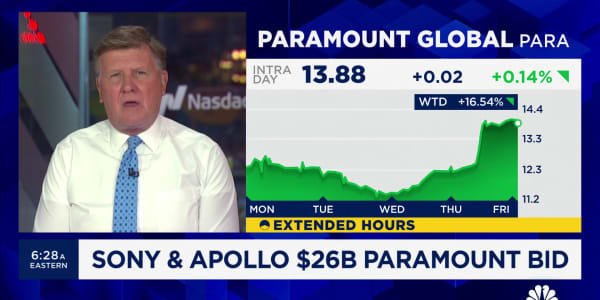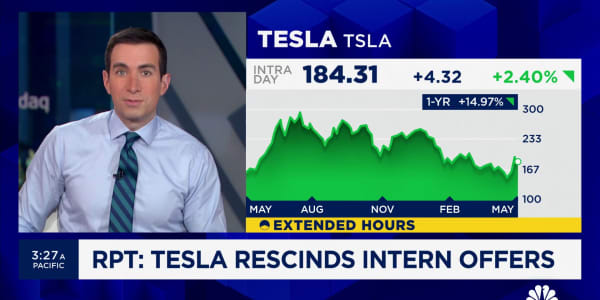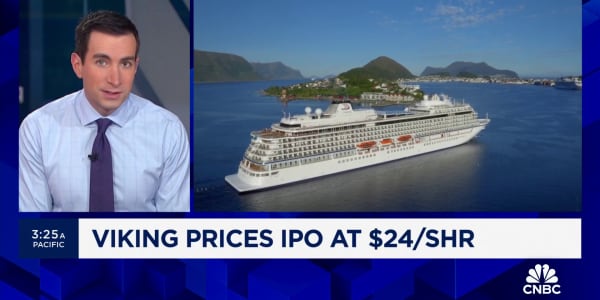From C-suite to C-ya
Many on Main Street America rail against corporate CEOs for their paychecks—354 times the salary of the average worker in 2012, by one estimate—but the hefty compensation packages do have their downside: About 40 percent of the highest-paid CEOs in the United States over the past 20 years eventually ended up being fired—or paid fraud-related fines or settlements, or accepted government bailout money, an Institute for Policy Studies released earlier this year stated.
Although GM has fully recovered from its bailout—the government recently sold the last of its stake—and announced a peaceful CEO transition; and Jamie Dimon will keep his job, even though JPMorgan agreed to pay the government $13 billion to settle multiple charges, 2013 was no exception in terms of tension-filled CEO departures from big companies.
Here's CNBC's take on the lessons learned from some of the high-profile CEO farewells of 2013, in chronological order.
—By Roy Luo, CNBC Digital news intern, and Eric Rosenbaum, CNBC.com
Former Chesapeake Energy CEO Aubrey McClendon
A press release announcing a CEO's departure, causing shares of the company to rally, is not the way a CEO wants to go out—but the truth is, that's often what happens.
Shares of jumped more than 9 percent when Aubrey McClendon announced his retirement from the company in January. Facing internal and external investigations stemming from a host of allegations, a consistent beating from the press and a debt loan on the balance sheet that threatened to sink the company--and its shareholders—Chesapeake's board finally reached an agreement with the CEO to split, some would say way, way late in the game.
McClendon cited "philosophical differences" with the board (i.e., they had been forced to start paying attention), and it was the end to a very long saga for a man who built one of the largest oil-and-gas explorers in the U.S. up from virtually nothing when he co-founded it in 1989. McClendon is already back with a new, privately funded multibillion-dollar oil-and-gas exploration company.
Chesapeake hired former Anadarko Petroleum executive Doug Lawler as CEO.
Lessons learned: McClendon may have been one of the most passionate, hardworking CEOs in America—even critics said that was the case—but grazing legal lines will eventually generate the same controversy as breaking them, especially when a risk-on balance sheet invites attention.
Former Groupon CEO Andrew Mason
Andrew Mason's quirkiness extended all the way to his severance package, which was a specific $378.36. The founder's personality was perpetually stuck in start-up culture, limiting his management effectiveness and disconnecting him from the realities of profit and revenue. Even with Mason's departure, Groupon still faces several big issues, and the company's stock has never recovered its IPO value—though it has rebounded this year.
"He just really never fit the type of a major corporate CEO, so when people see such poor performance ... they have trouble finding any reason to have faith."--Timothy Judge, management professor at the University of Notre Dame.
Eric Lefkofsky was named CEO to replace Mason.
Lesson learned: Unbridled quirkiness rarely rules the day in corporate America.
Former Pandora CEO, president and chairman Joe Kennedy
Pandora was once alone in Internet radio. Now it competes with the likes of iTunes Radio, Spotify, Google Play music, Dr. Dre's Beats music service (soon to launch) and—maybe most importantly—growing royalty costs. Joe Kennedy of expanding Pandora's market share but failed to manage as well the toll that increasing royalty charges placed on the online-radio service. Pandora needs growth to compete, but more growth means higher royalty fees and less profits.
The business model of Internet-streaming music service Pandora cannot work without a "lot more advertising."—Pandora competitor SiriusXM CEO Jim Meyer
Former venture capitalist, advertising and Microsoft executive Brian McAndrews replaced Kennedy.
Lesson learned: Growth needs to have purpose. Wildly chasing user growth often isn't enough.
Former J.C. Penney CEO Ron Johnson
The Silicon Valley swagger of Apple retail guru Ron Johnson just didn't fit in with the humble roots of . His grand strategy was to turn the retailer into "Bloomingdale's for Middle America." Yet in the process of changing Penney's image to reflect his tastes—and the luxury appeal that worked so well for Apple's retail stores—Johnson alienated the majority of customers that went to Penney for basics. Revenue dropped 25 percent in 2012, and problems still persist, though the revenue decline has slowed this year.
"If you're a certain customer and you've been shopping Penney's, that's kind of insulting. You're going to come in and say, 'There's nothing for me.'"—A former J.C. Penney executive
Mike Ullman, a former Penney CEO, returned to take over when Johnson left.
Lesson learned: Customer bases don't change on a whim, no matter how much you insult them.
Former P&G chairman and CEO Bob McDonald
Bob McDonald endured constant criticism from activist investors, including Bill Ackman, even as he helped lift P&G up from a dismal earnings outlook. A.G. Lafley, the previous CEO at P&G, had spearheaded new product hits, such as . Under McDonald, innovation took a backseat, with McDonald later admitting that the company was to react to thriftier shopping habits, create product hits and expand in fast-growing international markets.
And even once the turnaround was under way—shares still trail the market but are up 20 percent year-to-date—it was too late: McDonald retired due to the "distraction" of all the attention focused on him from "."
"I don't mean to diminish [Lafley's] great success as a leader, but arguably he left the company with a weak innovation pipeline. Perhaps he didn't invest adequately enough at the end of his tenure ... [and] that's how the company got into some of this."—Linda Weiser, senior analyst at B. Riley & Co.
Lafley has returned to the CEO role.
Lesson learned: Being content with business as usual just creates more work in the future.
Former Zygna CEO Mark Pincus
Mark Pincus piloted through rapid growth. However, once fatigue for Web-based social games started showing up, Pincus embarked on a variety of strategies to break into broader kinds of mobile gaming, only finding limited success. Zynga's strategy of quick acquisitions couldn't help in a mobile market moving very fast.
"None of us ever expected to face a day like today, especially when so much of our culture has been about growth. But I think we all know this is necessary to move forward."—Pincus, after breaking news of massive layoffs at Zynga
Former Microsoft executive Don Mattrick replaced Pincus.
Lesson learned: A business dependent on one factor of success is a formula for disaster.
Outgoing Microsoft CEO Steve Ballmer
The ever-energetic Steve Ballmer let slowly lose ground to and over mobile and Internet before realigning the company toward "devices and services." It wasn't enough. A company-wide reorganization effort is currently in place, but shareholders' minds were already set. Microsoft shares surged when it announced Ballmer's planned exit. Ballmer gave a four-hour farewell speech in September, urging shareholders and employees to continue the recent changes he enacted.
"If there's one thing I regret, there was a period in the early 2000s when we were so focused on what we had to do around Windows that we weren't able to redeploy talent to the new device form factor called the phone."—Ballmer
No replacement has yet been named, though that Ford's Allan Mulally is a candidate.
Lesson learned: First-mover advantage comes once and can become expensive quick.
Former BlackBerry CEO Thorsten Heins
Thorsten Heins's fate was tied directly to the success of the 10. Heins faced criticism from Day One of his reign. Critics wanted an outsider to be named CEO of the already struggling company, not an internal candidate. Heins and the rest of the BlackBerry leadership team went all in on the newest BlackBerry device. When it failed to meet expectations, Heins, along with the CMO, CFO and COO,
"It's going to take a strong, impassioned management team that is focused on what is right for BlackBerry and not replicate Apple and Google."—Stephen Beck, partner at CG42
Sybase executive John Chen—who led a turnaround at that company before it was sold to SAP—was hired as BlackBerry's next CEO.
Lesson learned: Sometimes radical change, rather than a steady transition among insiders, is required. Shuffling the chairs already in the C-suite and betting on the passion of longtime executives, especially at a struggling company, isn't good enough.
Outgoing Wal-Mart CEO Mike Duke
Mike Duke's last years at were embroiled in headaches ranging from in Mexico to a worker-pay outrage preceding Thanksgiving. In addition, during Duke's time as CEO, shares of Wal-Mart rose 69.3 percent, compared to the 118.5 percent growth in the S&P 500.
"Look, sometimes you just admit you're wrong. ... I guess this is the way they do it. It's not the way I would do it. It's the way they do it. And they're a bigger retailer than I am."—"Mad Money's" Jim Cramer
Doug McMillon, a company insider and former head of Wal-Mart's international business, was named CEO. Duke is staying on for a year in an advisory role and on the board.
Lesson learned: No CEO is above the law of the markets, even when overall performance is far from what can be considered terrible. Or, to quote an oldie but a goodie: Yes, the buck does stop at the CEO's desk, even in Benton, Arkansas, and even if a new CEO can't be expected to perform heroic acts when it comes to growing a mature, corporate giant.
Former Lululemon Chairman Chip Wilson
Lululemon CEO Christine Day announced her intention to resign in June, but it was company non-executive chairman and company founder Chip Wilson who was the higher-profile departure—once it becomes effective in June 2014. The defective sheerness of some tights can't personally be tracked back to Chip Wilson. However, Wilson's inflammatory comments on air about the apparel's intended consumer market exacerbated the problem and negatively linked his personal brand to a touchy social issue.
"Frankly, some women's bodies just don't actually work for [the pants]. It's really about the rubbing through the thighs, how much pressure is there over a period of time, how much they use it."--Chip Wilson
Laurent Potdevin, who came from philanthropically inclined TOMS Shoes, will replace Day effective January. Michael Casey, already lead director of the company's board, will replace Wilson.
Lesson learned: Actively alienating a potential customer base is akin to burning money. Oh, and don't talk to women about their weight unsolicited.




